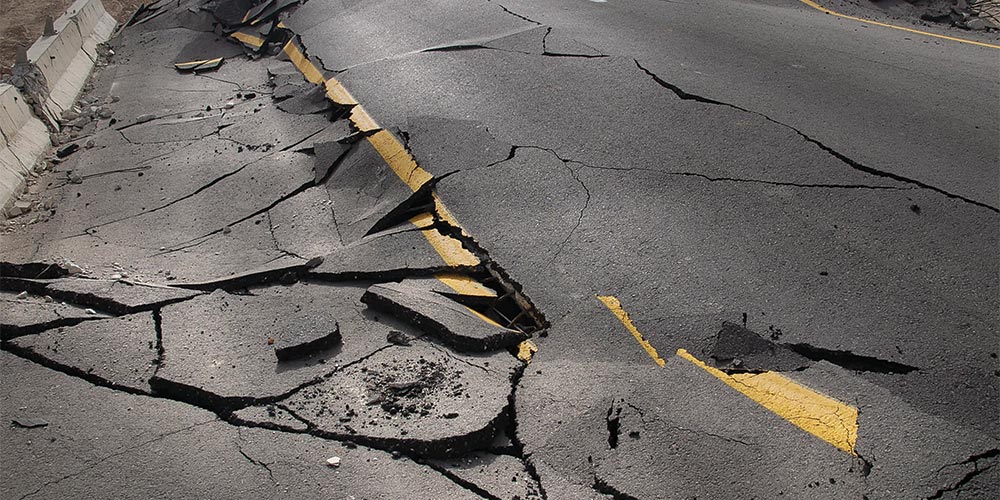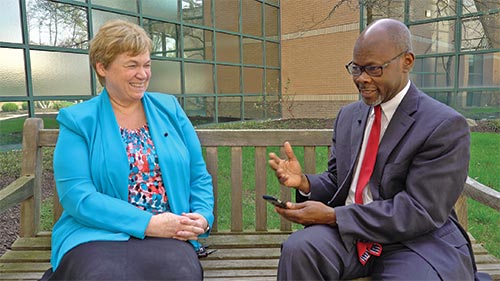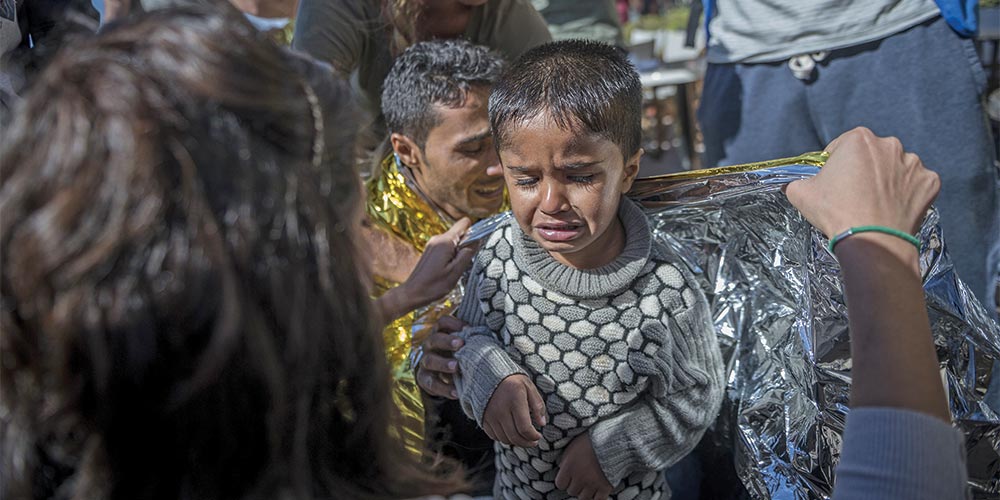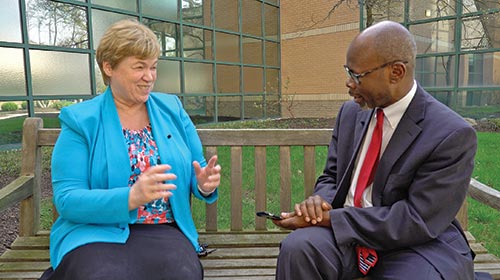
Lael Caesar, associate editor of Adventist Review, spoke with Andrea Luxton, president of Andrews University, about religion, theology, and Brexit. —Editors.
Here we are, out in God’s beautiful world, on the grounds of the headquarters of the Seventh-day Adventist Church, Silver Spring, Maryland. For company we’ve got the best—Andrea Luxton, president of Andrews University, the church’s flagship liberal arts institution. An intellectual and academic, she’s also British.
Tell me, Andrea, even before we talk about the spiritual or other significance of the vote on June 23, 2016, I’m wondering what you thought of the vote, because it wasn’t a general election, it was a referendum, and you folks don’t have a history of referenda. What made this one special or needing a referendum?
It’s actually interesting. After many years of not having a referendum, Britain had two in reasonably quick succession. One was about whether Scotland wanted independence. The second was Brexit. I think in both cases there was this feeling that these actions really impacted the whole country and every individual in a very particular way, and I think that’s why this was something that they decided they needed a referendum for rather than work through regular government processes.

Scotland hasn’t settled on that result.
No. They thought they had, but now that Brexit has come along they’re thinking, Well, I don’t know. Maybe we made the wrong mistake the first time. Yes, that’s another question, another issue.
Of course you can’t tell me what everybody was thinking, but if you had to select two or three elements that you think contributed particularly to the vote and the outcome, what might they be?
It’s a little bit hard, but listening to people who voted in favor, I think one big thing over many, many years has been the feeling [about] the European Union [EU], some of its legislation being very bureaucratic and really taking away the individuality of countries. I remember when I was a kid going around markets, and every store looked different. With EU everything became so regimented that everyone was buying through the same place, and so everything started looking the same even though there were different suppliers. That kind of individuality, I think, is something that through the years has bothered Britain some.
Brexit or Fix it from ARtv on Vimeo.
I think the second thing is that, as the European Union has expanded and you have free flow of people around Europe, especially with England being an English-speaking country, there’s tended to be more flow into the country than flow out of the country. I think some British feel, “Well, maybe if we didn’t have this free flow, there would be more jobs for us, there would be more money for us,” and so I think [theyhad] a reaction to that.
Brexit or Fix it from ARtv on Vimeo.
I’ve read that polls taken subsequently indicate that a lot of people who wished they had got a different result were people who didn’t participate in the vote. It makes me think of the responsibility that sometimes I feel I have. The Holy Spirit nudges me to do something and I say, “Oh, somebody else will do that.” Is there really a spiritual reflection to be had on the basis of an event like that?
I think there is. You’re right. In that particular case I think people were so convinced that it was going to go a particular way. Those that were going to vote against leaving the EU just felt, “OK, I’ll leave it up to others to vote,” and didn’t feel the importance of it. That’s just such a natural thing for all of us to do. We don’t want to be in the limelight. We want to see what everyone else is doing. We want to be one of the group, or we just can’t be bothered. So we just step back and don’t do things, whether it comes to things as a Christian that we should be doing in our community and looking out for each other, whether it is with talking to people about our faith. It’s just very easy to say “Oh, tomorrow” or “Oh, someone else will do it,” and let it go. That’s a problem.
Everybody thought somebody else would. . . . [A while] ago the Occupy movement here [in the United States] was very active and raised its voice and railed against the unevenness of gains from the economic growth the nation had experienced; and around the world [they] railed against the 1 percent. Do Christians have any business being preoccupied with or speaking up on economic and social and political issues like these?
The way we raise our voices becomes important. Do we, if we see something that we see is unjust, something in which people are being disadvantaged, have responsibility to speak? We do. But I think there’s a way of speaking up. We need to do so responsibly, but absolutely. The gospel talks about us being there to hold out for justice and hold out for those who do not have what they should have. Yeah, we have a right.
If you look at the Gospels, the only times you see Jesus really angry are those during which people exploit other people. Then He really threatens, almost, those that take that route.

He says awful things, such as “Better for you if you had not been born if you exploit one of My children.”
Yes, absolutely. Just think about the way He went about His own ministry. Yes, He talks about God the Father. Yes, He talks about who He is and His mission. But He’s also just out there doing good among the community. He does that not with expectation. It’s not, “Well, if I do this, are you now going to come and follow Me?” No, He doesn’t do that. Some just go away and never come back. Nine out of 10 lepers. But it doesn’t matter. He still does it.
I’m interrupting you perhaps, but if you’d been Australian instead of British, you would be with the Australian Union Conference, because they have joined a number of other churches to ask and require and urge their government to be more invested in social issues.
I don’t think this is about being a conservative or being a liberal, being Republican, being Democrat, or whatever other.
Or being British or Australian.
Exactly. I don’t think this has to do with any political group that is in authority. That’s where I don’t want to go as a Christian, or because I’m a Christian. But I think the whole issue of our policies, the way we live, the way as a country we work with other people and accept other people is how we should be as a nation and as Christians. If we aren’t, then, yes, that’s when we speak out.
How does our practice reflect God’s attitude to those who are needy, to those who are orphans, not just the needy in terms of those who are on the street where I live, but the needy everywhere?

That’s where we have a responsibility, and that’s a difficult and challenging thing. I don’t envy governments, because they have so many conflicting pressures on them to use money here or resources there or stand up for this. But the Christian perspective has to be, straight down the line, the concern about people and the quality of life that they are able to have just with basic things, with rights.
Today I heard a devotional that was given by a Dr. Priester, whose heart is in Malawi. She served as a missionary there for several years. She’s not there anymore, but she keeps going back and serving on a short-term basis. She talked about the poverty line in Malawi and said that more than 50 percent of the population lives below the poverty line. Then she said the poverty line is about $1.50 per day. I imagine she probably means U.S. dollars. That is what they identify as the poverty line.
You can’t talk theology when people are hungry, when their basic needs are not met. Or, getting away from basic needs, if they are in a difficult, challenging personal environment, it’s no good talking theology to them. It’s got to be how the gospel transforms and changes their lives, and Jesus is part of that.
There’s a social question I must ask about something that you were as deeply involved in as you could be as president at Andrews University: I saw a video, and it was put out by some students of Andrews University who are African American who feel that it’s time that they be recognized and their needs be recognized, and the misuse and the unfairness and the injustice of many years be addressed. Then you responded. For us it was astonishing. If you don’t mind me picking on you, could you tell me a little more about that?
Sure. When the video came out we had to decide, or I had to decide along with my team, What do we do with this? The first thing to do was just to listen to all the comments coming in. While quite a lot of people from all racial groups did not like the way the students put things out, they said, “You know, I was at Andrews University back in 1960 . . .” and then along comes a story. Or “I never was at Andrews University, but I went to this place and . . .” and now comes a story. It seemed to me that we had to deal with the issue, not the manner of approaching it, that maybe was a problem to some. That’s why we addressed it the way we did.
Probably, talking about the gospel, the way I presented it when I spoke back to the students in our chapel, I gave the story of the miracle concerning a man coming down through the roof to Jesus. When the hole was cut in the roof and this man was propelled down in the middle of the crowd, Jesus didn’t say, “What are you doing here?” He didn’t say, “Why have you cut a hole in the roof?” He just said, “You’re in pain. I need to respond.” That was how we felt. We felt [that] was the gospel response.
There were genuine issues, historic. We’re not perfect now; we just had to say, “Let’s deal with what’s in front of us. Let’s deal with the pain. Let’s deal with the hurt. That’s where our attention needs to go at this time.” That’s how we responded.
It just struck me, as you were responding to earlier questions, that you aren’t just saying that. You live that. So I hope you don’t mind me wandering from the issue, because . . .
No. It’s very easy when it comes to anything that is political or socially charged for us to get our intellects in the way of it and forget the gospel and start on our rights rather than asking, “What does the gospel tell us to do?” I by no means always get that right, but I think that’s really critical for the way that we build our community and the way we respond to the wider community around us. We’ve got to say, “Where does the gospel take me in this situation?”
Maybe this is that question put in different words: What most needs fixing in our world today, and what should we do about fixing it?
In two sentences? It strikes me that we spend far too much time talking and worrying about positions or ideas where we may differ. We sap our energy disagreeing. If we took the same amount of time, or even half that time, sitting down and listening to each other, understanding each other’s perspective, praying together, and then saying, “OK, where do we meet, and how do we focus our energies together on mission in areas where we can combine and where we can connect?”
I guess I’m really saying we have to focus on communication, on understanding, on the unity of Christ, recognizing our differences and how those differences bring strength and shouldn’t pull us apart. That’s a little bit idealistic. It may not work just like that, but if that’s where we start, we can go a long way. If we get too hung up on “How does this make me look?” or “They shouldn’t be saying that to me” or “How dare they disagree with my opinion!” we lose our way.
Thank you, Andrea. Maybe you have a last word for somebody who’s out there waiting to hear from you because the Spirit tells them, “Luxton has a word from Me for you.” What might that word be?
If I look back over my own career and the people who have most encouraged me and mentored me, what I remember most is not the skills that they may have presented to me. It’s always been about the way they have lived their faiths and the way they have lived their Christianity. That is what has influenced me more than anything else. That is what I want to do as a leader, as an administrator, and that’s what as a church we need to do. I think of the Ellen White statement that is often cited but is so true, that the best witness in the world is a loving and lovable Christian. That doesn’t deny the vital importance of theology and our unique theology as Adventists.
I know you’re not swearing off theology. You are a theologian.
Absolutely. I absolutely do not want to separate that, but our theology is also best understood through the gospel.